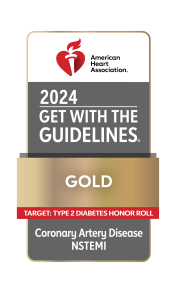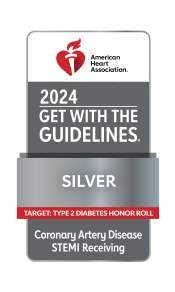Diagnosis
Cardiac Stress Test
A cardiac stress test, also called an exercise test or treadmill test, measures electrical (EKG/ECG) changes to your heart during stress and exercise. Using stress tests, a cardiologist can evaluate how your heart responds when it's being pushed.
Most often, you will walk on a treadmill or pedal on a stationary bike as your symptoms are carefully monitored to see how your heart reacts to the stress. This exercise detects any chest pain, shortness of breath, abnormal rhythms and palpitations, and shows the health of your heart valves and blood flow.
These test results help your doctor diagnose coronary artery disease (CAD). Stress tests also help your doctor know the type of exercise that will be appropriate for you, so you can work together to develop a routine exercise plan.
Nuclear Stress Test
A nuclear stress test measures blood flow to your heart muscle at rest and during stress/exercise. It is similar to a regular stress test, but provides images in addition to electrocardiograms. Nuclear pictures of the heart are taken before and after exercising.
At the start of the test, a very low level of radioactive substance is injected into your bloodstream. This substance mixes with your blood and travels to your heart. A special scanner, which detects the radioactive material in your heart, creates images of your heart muscle. Inadequate blood flow to any part of your heart will show up as a light spot on the images, which could mean there is a blockage in your arteries.
Persantine or Adenosine Cardiolite
For patients who are unable to walk on the treadmill, an intravenous medication (persantine or adenosine) can be given. This medication still allows the stress test to be performed with no exercise required.
Tilt Table Study
The tilt table study is used to evaluate patients who have had syncope (loss of consciousness). It is an extremely simple study, and in most cases is quite safe. The patient is strapped to a table, which is then mechanically tilted to an upright position. While monitoring the pulse, blood pressure, electrocardiogram and sometimes blood oxygen saturation, the patient is left in a standing position for 20 to 30 minutes. A positive tilt table result occurs when the patient's syncope happens during the test.
Contact Us
To schedule an appointment or for more information, please call 410-768-0919 or 410-760-5100.
- Testing is available Monday - Friday.




